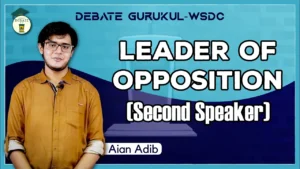Leader Of Opposition (Second Speaker) is the topic of today’s video. “Leader Of Opposition (Second Speaker)” is the 4th class of our new series “Introduction to English Debating”. We are currently publishing a series called “Introduction to English Debating”.
Leader Of Opposition (Second Speaker)
World Schools Style debating (or WSS) is a combination of the British Parliamentary and Australia-Asian debating formats, designed to meet the needs of the World Schools Debating Championships tournament. Each debate comprises eight speeches delivered by two teams of three members, representing the Proposition and Opposition sides. The first six speeches are eight minutes in duration, with each team then finishing up by giving a four-minute concluding reply speech. Teams are given 30 to 60 minutes to prepare for their speeches.

The primary goal of this speech is to set up the subsequent speeches in the debate. Naturally, this speech will have to include a substantial amount of refutation, as it covers the 16 minutes of material previously delivered in this round. The second speech is most frequently structured as follows: intro, clash points, and the introduction of the third substantive at the end of the speech.
The third substantive tends to be a substantive that turns the contents of the opponents’ speeches. For example, on the motion “this house would end sanctions on Venezuela,” a proposing team could be expected to make arguments about the economic benefits to the Venezuelan economy of ending sanctions. A good third substantive argument might be that sanctions force the Venezuelan economy to liberalize and ease the state-control of resources in a fragile economy.
Clash points in the second speech should group common positions together and respond accordingly, covering the material presented by both sides in a certain clash point. For example, on the prior motion regarding sanctions against Venezuela, the clash points could be centered around economic growth, risk of conflict, and principle argumentation. There is a large amount of flexibility and variance in approaches that different debaters take to writing the second speeches, so feel free to experiment and try new approaches.
Second speaker (Opposition or Proposition)
Their role is to rebut the arguments given by the other side and respond to the rebuttal given by the other side. Eventually, they can continue with their team’s case and give more arguments if they choose so.
Leader Of Opposition (Second Speaker) Details :
